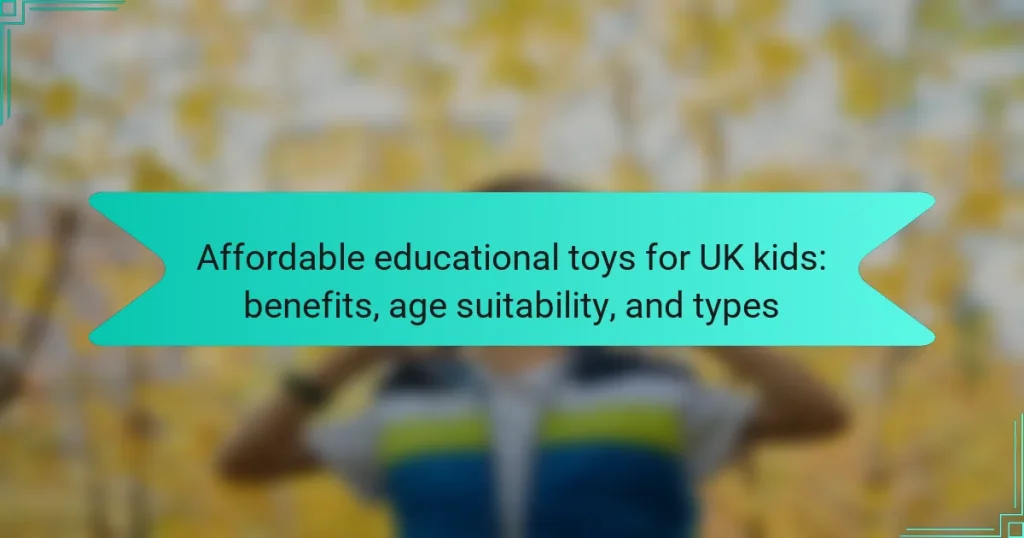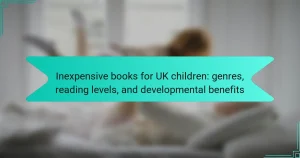Affordable educational toys for UK children include various options such as building blocks, puzzles, art supplies, educational board games, science kits, and language learning toys. These toys cater to different age groups, from infants to pre-adolescents, and are designed to enhance cognitive development, problem-solving skills, creativity, and social interaction. Building blocks improve spatial awareness, puzzles foster hand-eye coordination, and art supplies encourage self-expression. Many of these toys are available for under £20 at retailers like Argos and Amazon, making them accessible for families. Engaging with age-appropriate educational toys supports overall learning and development in children.
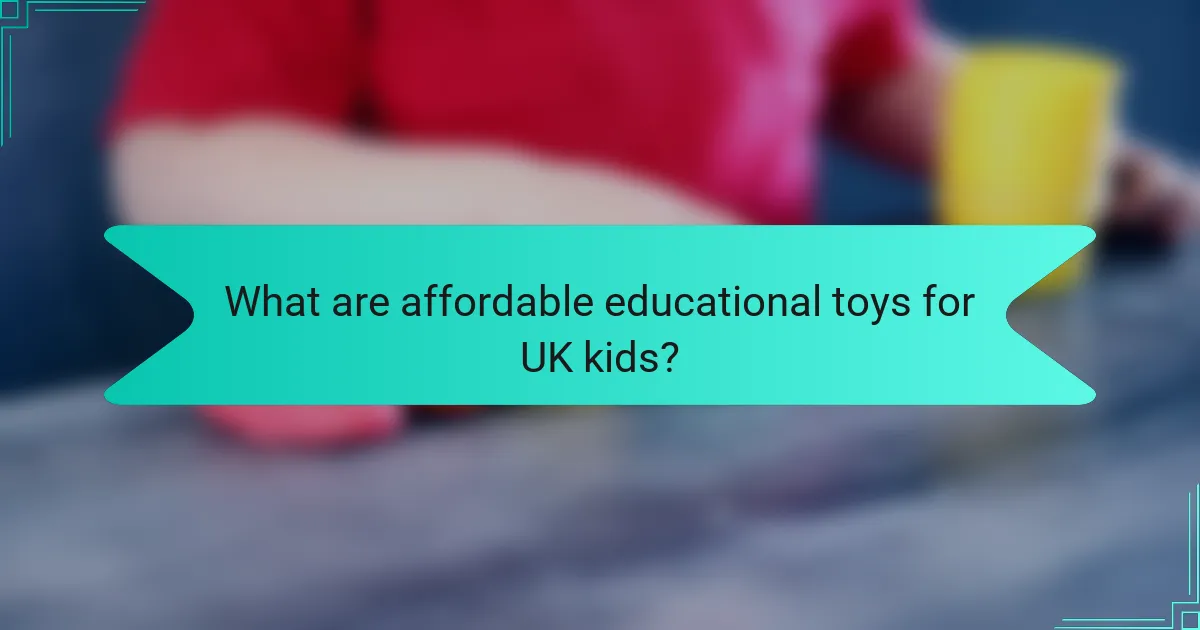
What are affordable educational toys for UK kids?
Affordable educational toys for UK kids include options like building blocks, puzzles, and art supplies. Building blocks enhance spatial awareness and creativity. Puzzles develop problem-solving skills and hand-eye coordination. Art supplies encourage creativity and fine motor skills. Educational board games promote social skills and critical thinking. Many of these toys are available at budget-friendly prices, often under £20. Retailers such as Argos and Amazon offer a wide selection of these toys. Research shows that engaging in play with educational toys supports cognitive development in children.
Why are affordable educational toys important for children’s development?
Affordable educational toys are important for children’s development because they promote learning through play. These toys enhance cognitive skills, such as problem-solving and critical thinking. They also support social skills by encouraging interaction with peers. Furthermore, affordable options ensure that all children have access to quality learning resources. Research shows that play-based learning can improve academic outcomes. A study by the American Academy of Pediatrics highlights the link between play and brain development. Affordable educational toys make developmental benefits accessible to a wider range of families. This inclusivity fosters a more equitable learning environment for all children.
What skills do educational toys help develop in children?
Educational toys help develop various skills in children. They enhance cognitive abilities, including problem-solving and critical thinking. These toys often encourage creativity through imaginative play. Motor skills are improved by manipulating different toy parts. Social skills are fostered during group play scenarios. Emotional development is supported as children navigate challenges and successes. Research indicates that play-based learning significantly boosts academic readiness. For example, a study by the American Academy of Pediatrics highlights the importance of play in developing essential life skills.
How do these toys contribute to cognitive growth?
Educational toys enhance cognitive growth by stimulating critical thinking and problem-solving skills. These toys often incorporate puzzles, building blocks, and interactive games. Engaging with these toys encourages children to explore concepts like shapes, numbers, and spatial awareness. Research shows that play-based learning significantly boosts cognitive development in early childhood. A study from the University of Cambridge found that children who engage with educational toys score higher on cognitive assessments. Furthermore, these toys promote creativity and imagination, fostering innovative thinking. They also improve memory and attention span through repetitive play and challenges. Overall, educational toys serve as effective tools for cognitive enhancement in young children.
What are the key benefits of using affordable educational toys?
Affordable educational toys enhance learning and development in children. They promote cognitive skills through interactive play. These toys are often designed to be engaging and stimulating. They encourage creativity and problem-solving abilities. Affordable options make these educational tools accessible to a wider audience. Research indicates that play-based learning significantly benefits early childhood development. According to a study by the American Academy of Pediatrics, play is essential for brain development. Affordable educational toys can also support social skills through cooperative play. They help children develop fine motor skills with hands-on activities.
How do these toys enhance learning experiences?
These toys enhance learning experiences by promoting active engagement and critical thinking. They encourage hands-on exploration, which aids in cognitive development. Interactive features stimulate curiosity and motivate children to learn. Educational toys often incorporate problem-solving elements, fostering analytical skills. Research shows that play-based learning can improve retention of information. For instance, a study by the University of Cambridge found that children learn better through play. Additionally, these toys can enhance social skills through cooperative play. They provide opportunities for communication and teamwork among peers. Overall, educational toys create a dynamic learning environment that supports various developmental milestones.
What social skills can children learn from educational toys?
Children can learn various social skills from educational toys. These toys promote teamwork through collaborative play, encouraging children to work together. They also enhance communication skills by requiring kids to express ideas and negotiate rules. Educational toys foster empathy as children learn to understand others’ feelings during interactions. Additionally, they help develop problem-solving skills through shared challenges. Research shows that play-based learning can significantly improve social competence in early childhood. For example, a study published in the Journal of Child Psychology and Psychiatry found that children who engage in cooperative play show better social skills than those who do not.
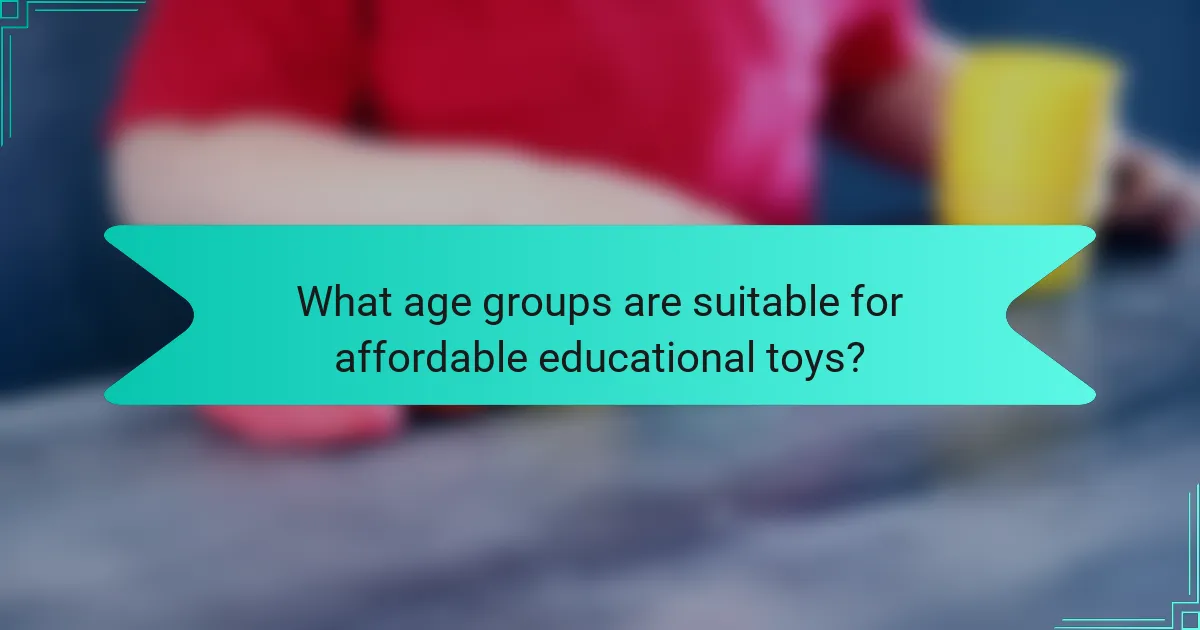
What age groups are suitable for affordable educational toys?
Affordable educational toys are suitable for children from infancy to pre-adolescence. Infants aged 0-12 months benefit from sensory toys that stimulate their senses. Toddlers aged 1-3 years can engage with toys that promote basic motor skills and cognitive development. Preschoolers aged 3-5 years enjoy toys that encourage imaginative play and early learning concepts. Children aged 6-8 years can use educational toys that support problem-solving and critical thinking skills. Lastly, kids aged 9-12 years can benefit from more complex toys that challenge their creativity and knowledge. Research indicates that age-appropriate toys enhance learning and development across these age groups.
How can parents determine the right toys for different age ranges?
Parents can determine the right toys for different age ranges by consulting age recommendations on packaging. Most toys include labels that indicate suitable age groups. These labels are based on safety standards and developmental milestones. For example, toys for infants focus on sensory development. Toddlers benefit from toys that encourage fine motor skills. Preschoolers often require toys that promote imaginative play. School-age children typically need toys that challenge problem-solving abilities. Research shows that age-appropriate toys enhance learning and engagement. Parents should also consider their child’s interests and developmental stage when selecting toys.
What are the recommended age ranges for various types of educational toys?
Recommended age ranges for educational toys vary by type. For infants (0-12 months), sensory toys are ideal. These toys stimulate sight, sound, and touch. For toddlers (1-3 years), building blocks and shape sorters promote motor skills and problem-solving. Preschoolers (3-5 years) benefit from puzzles and creative arts. These enhance cognitive skills and creativity. Early school-age children (5-7 years) can use educational games that teach math and reading. These games support foundational learning. Each toy type aligns with developmental milestones, ensuring age-appropriate engagement and learning.
How does age suitability impact the effectiveness of educational toys?
Age suitability significantly impacts the effectiveness of educational toys. Toys designed for specific age groups align with developmental milestones. For instance, infants benefit from toys that promote sensory exploration. Toddlers require toys that encourage fine motor skills and problem-solving. Preschoolers thrive with toys that enhance cognitive skills and social interaction.
Research shows that age-appropriate toys improve engagement and learning outcomes. According to a study by the American Academy of Pediatrics, children are more likely to learn when toys match their developmental stage. This alignment fosters curiosity and motivation in play. Therefore, selecting toys based on age suitability maximizes their educational potential.
What factors should parents consider when choosing educational toys for their kids?
Parents should consider safety, age appropriateness, and educational value when choosing educational toys. Safety ensures that toys are free from harmful materials and have no small parts that could pose choking hazards. Age appropriateness guarantees that the toy matches the child’s developmental stage, promoting engagement without frustration. Educational value involves assessing how well a toy fosters skills like problem-solving, creativity, and motor skills. Research shows that toys designed for specific age groups enhance learning outcomes significantly. For instance, the American Academy of Pediatrics emphasizes the importance of matching toys to developmental milestones to support cognitive growth.
How do safety standards influence toy selection?
Safety standards significantly influence toy selection by ensuring that products are safe for children. These standards set guidelines for materials, manufacturing processes, and design features. Compliance with safety regulations helps prevent injuries and hazards. For instance, toys must be free from toxic substances and sharp edges. The British Standards Institution (BSI) provides specific safety standards for toys sold in the UK. Research indicates that adherence to these standards reduces the risk of accidents. Consequently, parents and retailers prioritize toys that meet safety certifications. This focus on safety ultimately impacts purchasing decisions and enhances consumer trust.
What role does child interest play in selecting educational toys?
Child interest is crucial in selecting educational toys. When children show interest in a toy, they are more likely to engage with it. This engagement enhances learning experiences and encourages exploration. Toys that align with a child’s interests can foster creativity and problem-solving skills. Research indicates that children learn better when they are motivated and excited about a topic. For instance, a study by the University of Cambridge found that interest-driven play supports cognitive development. Thus, selecting toys that capture a child’s interest is essential for effective learning.
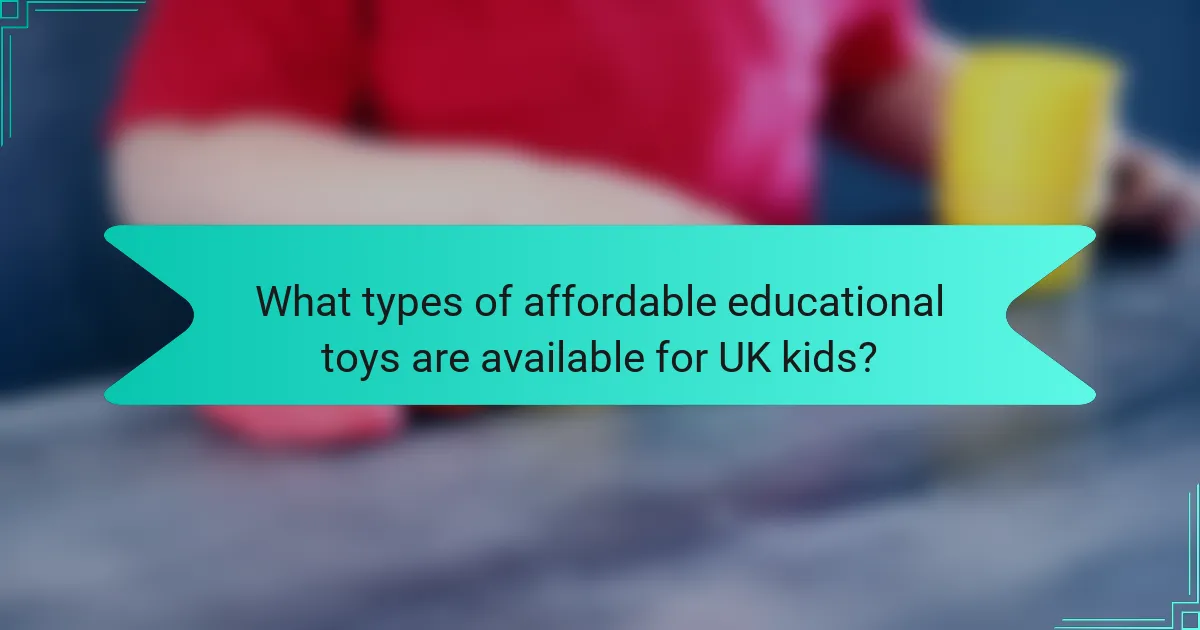
What types of affordable educational toys are available for UK kids?
Affordable educational toys for UK kids include building blocks, puzzles, and art supplies. Building blocks enhance spatial awareness and fine motor skills. Puzzles improve problem-solving abilities and cognitive development. Art supplies foster creativity and self-expression. Educational board games teach social skills and strategic thinking. Science kits encourage exploration and understanding of basic scientific principles. Language learning toys support vocabulary development and communication skills. Each type of toy provides a unique learning experience while being budget-friendly.
What are the different categories of educational toys?
The different categories of educational toys include STEM toys, language development toys, arts and crafts toys, and social-emotional toys. STEM toys focus on science, technology, engineering, and mathematics concepts. Language development toys help enhance vocabulary and communication skills. Arts and crafts toys encourage creativity and fine motor skills. Social-emotional toys promote interpersonal skills and emotional intelligence. Each category serves specific developmental needs, making them essential for children’s growth.
How do construction toys aid in problem-solving skills?
Construction toys enhance problem-solving skills by encouraging critical thinking and creativity. These toys require children to plan, design, and execute their ideas. As they build structures, kids face challenges that demand solutions. For instance, they learn to balance stability with aesthetics. This process fosters analytical skills and spatial awareness. Research indicates that children who engage with construction toys show improved cognitive abilities. A study by the University of Cambridge found that constructive play significantly boosts problem-solving skills in early childhood development.
What role do art and craft kits play in creative development?
Art and craft kits significantly enhance creative development in children. These kits provide structured opportunities for self-expression. They encourage imaginative thinking through various activities. Children learn to experiment with colors, shapes, and materials. This experimentation fosters problem-solving skills. Engaging with art and craft kits also boosts fine motor skills. Studies show that creative activities can improve cognitive function. For example, a study published in the Journal of Creative Behavior found that art activities enhance critical thinking and innovation in children. Thus, art and craft kits play a crucial role in nurturing creativity.
How can parents find the best deals on educational toys?
Parents can find the best deals on educational toys by comparing prices across multiple retailers. Online platforms often offer price comparison tools. Websites like PriceRunner and Google Shopping can help identify the lowest prices. Additionally, subscribing to newsletters from toy retailers can provide access to exclusive discounts. Seasonal sales events, such as Black Friday and Back to School sales, are prime opportunities for savings. Parents should also consider purchasing second-hand toys from platforms like eBay or local marketplaces. Checking for coupons and promotional codes before making purchases can further reduce costs. Research shows that savvy shopping can save parents up to 50% on educational toys.
What are some reliable sources for purchasing affordable educational toys?
Reliable sources for purchasing affordable educational toys include Amazon, Walmart, and Target. Amazon offers a wide range of educational toys at competitive prices. Walmart frequently has discounts on various educational toy brands. Target provides a curated selection of affordable educational toys, often featuring sales and promotions. Additionally, local thrift stores and educational supply stores may have budget-friendly options. Online marketplaces like eBay also offer pre-owned educational toys at lower prices. These sources are known for their customer reviews and return policies, ensuring a reliable shopping experience.
How can parents compare prices and quality effectively?
Parents can compare prices and quality effectively by researching multiple retailers. They should utilize online price comparison tools to find the best deals. Reading customer reviews helps assess the quality of the toys. Checking product specifications can clarify differences in materials and features. Visiting local stores allows parents to see products firsthand. They can also ask for recommendations from other parents. Monitoring sales and discounts can lead to better prices. Finally, considering the educational value alongside price ensures a balanced decision.
What tips can parents follow to maximize the benefits of educational toys?
Parents can maximize the benefits of educational toys by actively engaging with their children during play. This involvement enhances learning and retention of skills. Setting specific learning goals can guide the play experience. For example, parents can focus on developing fine motor skills or problem-solving abilities. Rotating toys regularly keeps the child’s interest and promotes exploration of different concepts. Creating a designated play area encourages focus and minimizes distractions. Encouraging open-ended play fosters creativity and critical thinking. Lastly, discussing the toy’s function and purpose can deepen understanding and reinforce learning. Research shows that interactive play significantly boosts cognitive development in children.
Affordable educational toys for UK kids are essential tools that promote cognitive, social, and emotional development through engaging play. This article explores the importance of these toys, detailing their benefits, age suitability, and various types available. Key topics include how educational toys enhance problem-solving skills, creativity, and social interaction, as well as tips for parents on selecting age-appropriate toys and maximizing their educational value. Additionally, the article highlights reliable sources for purchasing these toys at budget-friendly prices, ensuring accessibility for all families.
